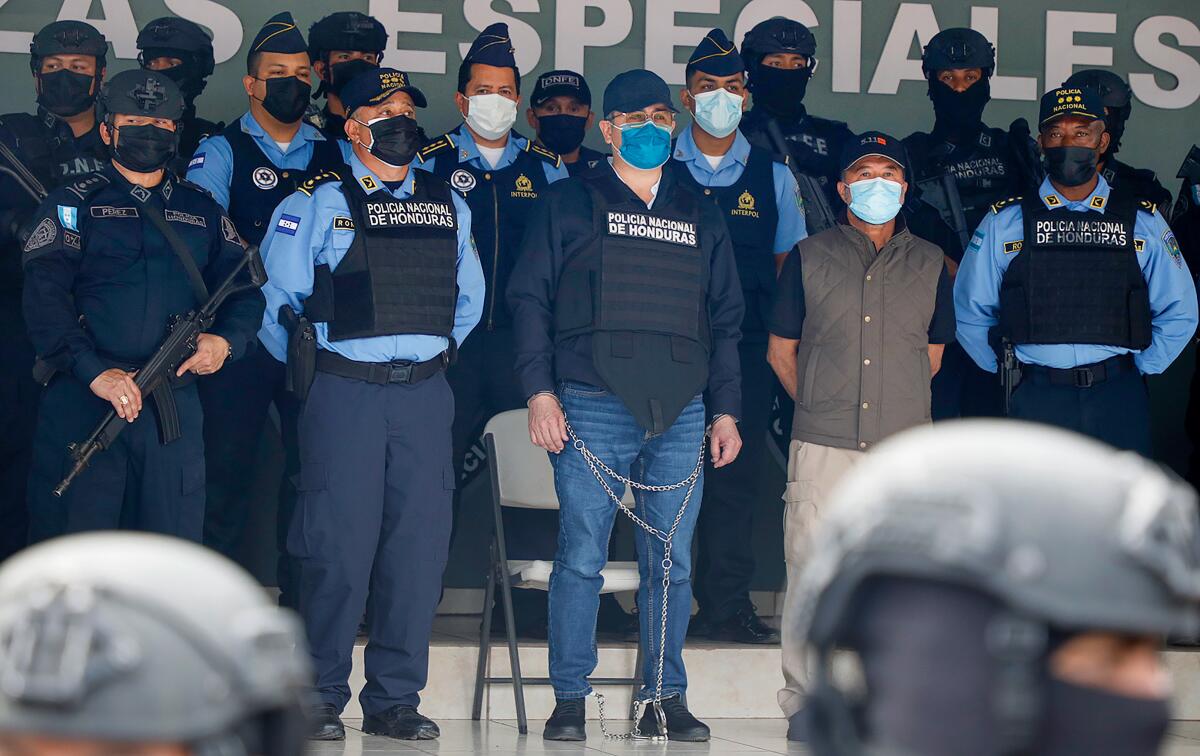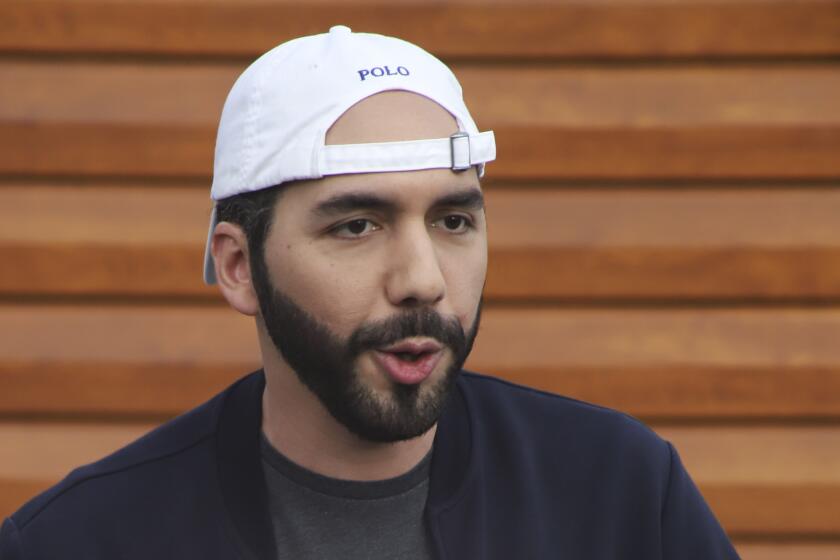Once celebrated by American leaders, former Honduran president now sought on U.S. drug charges

TEGUCIGALPA, Honduras â For years, U.S. officials faced an uncomfortable dilemma: The president of Honduras was one of Washingtonâs top allies in Central America â but evidence was mounting that he was also a drug trafficker.
U.S. prosecutors identified President Juan Orlando Hernández as a co-conspirator in a drug smuggling case against his brother and by last fall appeared ready to indict him.
But the Biden administration resisted. White House officials were reluctant to go after a sitting head of state â especially one whose government had received hundreds of millions of dollars and other crucial support from the Americans.
They urged prosecutors to wait at least until Jan. 27, when Hernández left office and a new president was sworn in.
It all came to a dramatic head late Monday when State Department officials formally requested his extradition on drug trafficking and weapons charges.
The request alleged that Hernández took part in a âviolent drug-trafficking conspiracyâ that since 2004 has smuggled more than 1 million pounds of cocaine into the United States. It also alleged that he had received millions of dollars in bribes for arranging shipments and protecting traffickers from prosecution.
On Tuesday, Honduran police descended on an upscale neighborhood in the capital, Tegucigalpa, and escorted Hernández out of his home, his wrists and ankles in chains.
His arrest was a cathartic moment for ordinary Hondurans, who turned against Hernández long ago. Across the country, people took to the streets to light fireworks and chant what had become a popular slogan: âOut with the narco dictatorship!â
âHonduras has been a narco state,â said street vendor Cilas Izaguirre, who waited outside Hernándezâs home Tuesday morning, hoping for a chance to yell at the former president as he was led away. âHe has to pay for everything he has done.â
It remains to be seen whether Hernández will actually be extradited.
After leaving office, he was elected as a member of the Central American Parliament, which lawyers have argued may give him immunity from prosecution. His right-wing National Party controls a large portion of Congress.
And as president, Hernández stacked the Supreme Court â which will rule on the extradition request â with his allies.
Whatever happens, there was no denying that the image of the former president in handcuffs represented a steep fall from grace for a man who was once celebrated by top American leaders for fighting corruption.
At a 2016 summit aimed at deepening ties between the U.S. and Central America, then-Vice President Joe Biden beamed in a photograph with Hernández and two other since-disgraced presidents, Jimmy Morales of Guatemala and Salvador Sánchez Cerén of El Salvador.
At the time, record numbers of young migrant children were fleeing violence and poverty in the region and arriving at the U.S. border. Biden, who was tasked with addressing the crisis by President Obama, lobbied Congress for more than a billion dollars in aid for Honduras, Guatemala and El Salvador to address the âroot causesâ of migration, more than tripling existing U.S. aid to the region.
In an opinion piece for the New York Times, Biden lauded Honduras for combating corruption. He and others in the Obama administration stood by Hernández even after his handpicked Supreme Court helped him change the Constitution to let him seek another term, and even after he was accused of stealing the 2017 presidential election.
Eric Olson, an expert on Central America, said Bidenâs approach then was to glad-hand and amiably try to persuade the presidents to cooperate with the U.S. goal of reducing migration.
âAt the time, the U.S. policy was to cajole,â said Olson, a fellow at the nonpartisan Wilson Center think tank in Washington. âEventually, they came to the conclusion that these guys were not cajole-able. The scenario has changed, they finally woke up and smelled the coffee and realized how deeply corruptâ the officials were.
The drug trafficking allegations helped turn the tide.
In 2018, U.S. authorities arrested the presidentâs brother, Juan Antonio âTonyâ Hernández, on drug trafficking charges. During the trial, witnesses testified that the former congressman was aided by the president, who they said used his political power to move cocaine from Colombia to the United States.
Prosecutors alleged that Tony Hernández accepted a $1-million bribe from the Mexican kingpin Joaquin âEl Chapoâ Guzman on behalf of his brother and that he carried an Uzi machine gun inscribed with his brotherâs initials.
Juan Orlando Hernán-dez has repeatedly denied those claims.
The Trump administration seemed willing to turn a blind eye to the drug trafficking allegations as long as Hernández cooperated on holding back migrants.
The tone shifted considerably when Biden took office.
Vice President Kamala Harris, whose portfolio includes immigration policy in Central America, never met or talked to Hernández. Other senior administration officials, including USAID Director Samantha Power, avoided him by staying out of Tegucigalpa and visiting the Honduran city of San Pedro Sula instead.
After Hernándezâs brother was sentenced to life in prison in a New York federal court last March, Harris pressed for an indictment against him. But the prevailing view in the White House was to wait.
Only rarely has the U.S. government tried to prosecute a sitting president â the Clinton administration pushed to remove Slobodan Milosevic as president of Serbia and try him in international courts for the mass slaughter of Bosnians.
But if the leader is seen as an ally, even a shady one, Washington tends not to act.
With his carefully crafted social media presence and populist politics, Nayib Bukele has become one of the most popular politicians on Earth. Now just one question remains: What does he want?
The Biden administration, uneasy in dealing with increasingly autocratic and corrupt governments elsewhere in Central America, rushed to embrace Hernándezâs left-leaning successor, Xiomara Castro, who roundly defeated his partyâs candidate in the November presidential election.
Harris made a high-profile appearance at her inauguration.
The Biden administration had already signaled Hernándezâs days might be numbered. In July, he was blacklisted along with about 50 other officials and businesspeople from Honduras, Guatemala and El Salvador deemed by the State Department to be too corrupt to work with or allow into the United States.
The extradition request accuses Hernández of drug trafficking through 2022 and of using drug profits to run campaigns for himself and members of his party.
It also alleges that as president he shared details about Honduran and U.S. military anti-drug operations with his drug trafficking partners.
While the extradition request was widely hailed, some said it came too late.
âThis was just the latest example of supporting an autocratic, corrupt regime in Latin America because it claimed to be tough on drugs, tough on migrants, or both,â said Sen. Patrick J. Leahy, a Vermont Democrat and a longtime critic of Hernández. âThroughout the past eight years of decay, depravity, and impunity, successive U.S. administrations sullied our reputation by treating Hernández as a friend and partner.â
Dana Frank, a professor of Honduran history at UC Santa Cruz, said U.S. officials helped Hernández hold on to power for two terms by continuing to provide his government with critical aid and law enforcement cooperation.
She said U.S. officials almost certainly knew about Hernándezâs alleged ties to drug traffickers well before the case against his brother.
âThere was military aid and intelligence sharing up to the end,â she said. âNow suddenly theyâre dumping their little monster and looking heroic.â
Times staff writers Linthicum reported from Mexico City and Wilkinson from Washington. Special correspondents Cerrato reported from Tegucigalpa and Cecilia Sanchez from Mexico City.
More to Read
Sign up for Essential California
The most important California stories and recommendations in your inbox every morning.
You may occasionally receive promotional content from the Los Angeles Times.













